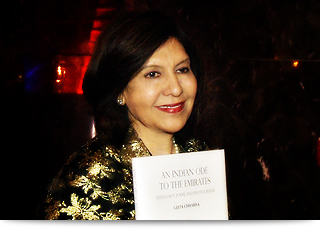An Indian ode
to the emirates
with forty poems and photographs
geeta Chhabra
Introduction
Geeta Chhabra
 Chhabra’s lyrical poetry is at once highly personal and absorbed with larger metaphysical issues. Her first source of inspiration as a child came from her musical family, particularly her father, who recited and translated Urdu poets such as Zauq and Ghalib. Her broad-based tastes in the music and poetry of the subcontinent are reflected in her verse and the poems in this collection also open up a dialogue between India and Dubai. Consequently the form of this duallanguage edition of her poems – with the original English versions translated into Arabic by the eminent poet and translator Dr Shihab Ghanem, whose own work has forged important cultural links between Dubai and India – is admirably suited to the expression of her cross-cultural vision. The collection brings together a selection of new verse and poems previously published in prominent.Arabic newspapers and journals, such as Al Ittihad, Al Bayan, Al Thaqafiah and Al Khaleej Cultural Supplement, as well as Dr Ghanem’s Likai Tarsom Sawrat Tayer. Geeta Chhabra’s early mentor was one of India’s most acclaimed poets, Nissim Ezekiel, and although the Emirati settings of her poems are very different from those of his Mumbaicentred verse, they sometimes view the external world from a similar vantage point, since their primary perspective is that of a spectator. In Ezekiel’s ‘Poet, Lover, Birdwatcher’, he assumes the persona of the poem’s title, drawing analogies between the pursuits of ornithologists and lovers, who he suggests should never “force the pace”, and the profession of the poet. In Chhabra’s ‘In the Garden’, she too is a watcher, a meditative observer of the “capricious form” of a bird. This poem describes a fleeting moment, but it is one that lingers in memory, as she hopes that the garden’s “chance guest” may reappear. The mood is more lyrical than that of Ezekiel, who has usually been viewed as a late Modernist and the most influential figure in the revolt against romanticism and mystical obscurantism that occurred in Indian poetry in English in the third quarter of the twentieth century, 1 but the angle of vision is essentially the same.
Chhabra’s lyrical poetry is at once highly personal and absorbed with larger metaphysical issues. Her first source of inspiration as a child came from her musical family, particularly her father, who recited and translated Urdu poets such as Zauq and Ghalib. Her broad-based tastes in the music and poetry of the subcontinent are reflected in her verse and the poems in this collection also open up a dialogue between India and Dubai. Consequently the form of this duallanguage edition of her poems – with the original English versions translated into Arabic by the eminent poet and translator Dr Shihab Ghanem, whose own work has forged important cultural links between Dubai and India – is admirably suited to the expression of her cross-cultural vision. The collection brings together a selection of new verse and poems previously published in prominent.Arabic newspapers and journals, such as Al Ittihad, Al Bayan, Al Thaqafiah and Al Khaleej Cultural Supplement, as well as Dr Ghanem’s Likai Tarsom Sawrat Tayer. Geeta Chhabra’s early mentor was one of India’s most acclaimed poets, Nissim Ezekiel, and although the Emirati settings of her poems are very different from those of his Mumbaicentred verse, they sometimes view the external world from a similar vantage point, since their primary perspective is that of a spectator. In Ezekiel’s ‘Poet, Lover, Birdwatcher’, he assumes the persona of the poem’s title, drawing analogies between the pursuits of ornithologists and lovers, who he suggests should never “force the pace”, and the profession of the poet. In Chhabra’s ‘In the Garden’, she too is a watcher, a meditative observer of the “capricious form” of a bird. This poem describes a fleeting moment, but it is one that lingers in memory, as she hopes that the garden’s “chance guest” may reappear. The mood is more lyrical than that of Ezekiel, who has usually been viewed as a late Modernist and the most influential figure in the revolt against romanticism and mystical obscurantism that occurred in Indian poetry in English in the third quarter of the twentieth century, 1 but the angle of vision is essentially the same.
Reading the poems in this collection together, a uniformity of both perspective and attitude emerges. Places, both natural landscapes and the built environment of Dubai, are frequently the starting point for personal reflections, which often turn out to have broader significances linked to history, faith and communal affiliations. Ultimately, then, Geeta Chhabra’s poems are an inspirational testament to the power of intercultural dialogue. They wrestle with existential doubt and resist easy resolutions, but from their engagement with enigma a strong sense of the potential for fulfilment to be found from straddling two cultures emerges. Her poetry is a moving testament to the positive aspects of the confluence of two cultures that are both separated and united by the Arabian Sea.
Professor John Thieme
University of East Anglia, UK
August 2011